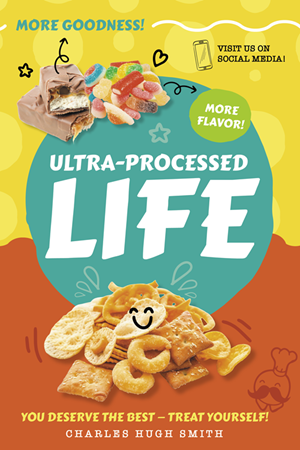

|
|
Is Life Now a Snack?
How we experience the world has changed, and not for the better. Is daily life now a snack? This is the premise of my new book, Ultra-Processed Life. What makes this interesting is it's something we can all observe in our daily lives--how the processes that make ultra-processed snacks so addictive and unhealthy have spread into every nook and cranny of life. I liken this normalization of addictive and unhealthy lifestyles to an aggressive invasive jungle vine that soon smothers the native forest. Like the vine, Ultra-Processed Life is extremely successful at drawing us in: who can resist the brightly packaged, oh-so-tasty New and Novel? As I note in the book, I think I have a healthy amount of self-discipline, but the moment I crunch into a salty, sweetly oily snack, every shred of self-discipline dissolves, and I'm reaching into the cheery bright package for another one, and then another one until there's none left. This is how Ultra-Processed Life works: it activates our built-in desire for whatever makes us feel good in the moment--a dopamine rush that can be unleashed by a broad range of stimulants. In effect, ultra-processed goodies hijack our hard-wired appetites for what's scarce in Nature. This extends beyond food into the digital realm, where the screen becomes the snack we can't stop consuming. Though the dopamine hit feels good in the moment, the long-term consequences are not positive. Once life is reduced to moving from one dopamine hit to the next, we not only enter the unhealthy realm of addictive behaviors, we lose touch with the unprocessed world, and lose our taste for unprocessed life: after becoming accustomed to a diet of unprocessed foods bursting with sweetness, salt and savory fats, real food--and thus real life--loses its appeal. This generates a great tide of perverse consequences. These ultra-processed replacements of unprocessed life offer up endless temptations begging to be indulged: Ultra-Processed Life is like living in a candy store without any adults to stop us from eating as much as we want. I can think, "eating this entire package of unhealthy snacks is not good for me," but our rational filters don't stop the pleasures and comforts of the dopamine rush. There is a rich vein of irony, perversion and paradox in this. Products, services and experiences are designed to attract and addict us, and when our rational filters fail, then the fault is ours: tsk-tsk, you didn't display god-like self-discipline. What's changed isn't our hard-wiring. What's changed is our industrial and communications technologies' powers to activate and exploit our hard-wiring. Now that life is so overwhelmingly complex, we find solace in a simplified sandbox world of Ultra-Processed Life because it offers immediate gratification and relief. The cost is higher than we realize, for the sources of authentic human fulfillment and happiness can't be packaged and commoditized. What we're consuming is artificial, a manufactured contrivance that's profitable for the purveyors but not for the consumers. This world is now hyper-normalized: if it's all we know, then we think it's all there is, and so we no longer recognize its impoverishment and artificiality. My analogy is the forest: if a child has only experienced a tree-farm forest, trees planted to maximize future profits, they naturally assume "this is a real forest." But this is not an authentic forest. If the child never visits a pristine native forest that has never been clear-cut, they will never experience a real forest. If all the child has ever eaten is commoditized bread manufactured to extend its shelf life, they will never know what real bread tastes like. In this simplified hyper-normalized version of daily life, if it's not on the screen, it doesn't exist. It does exist, but we're no longer aware of it. This is why the first chapter of the book is entitled The Machinery of Bewitchment. If you'd like to read a bit more, the book's Introduction and first section are free in PDF format. As with many others, the catalyst for this journey was a life-threatening medical crisis. This led us to a path away from Ultra-Processed Life, a path I discuss in the book. Ultra-Processed Life explores how our experience of the world has changed, and not for the better. I think you'll find the ideas intriguing and worthy of exploration. Ultra-Processed Life print $16, (Kindle $7.95, Hardcover $20 (129 pages, 2025) 
Ultra-Processed Life print $16, (Kindle $7.95, Hardcover $20 (129 pages, 2025) |
|
| |
|
Copyright 2025 Charles Hugh Smith all rights reserved in all media. No reproduction in any media in any format (text, audio, video/film, web) without written permission of the author. |
|